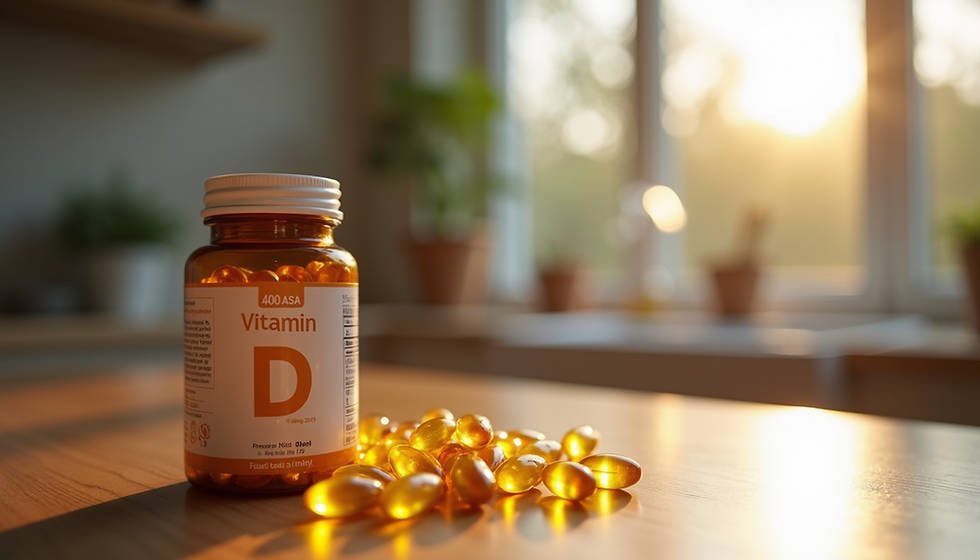Probiotics 101 How Do These Tiny Bacteria Become Our Gut Heroes
- Kristina TOSEVSKA

- Aug 7, 2025
- 3 min read
In our busy lives, gut health often slips into the background. However, tiny bacteria play a crucial role in maintaining that health. Probiotics, often called "gut heroes," are at the forefront due to their positive effects on our well-being. But what qualifies a bacterial species as a probiotic? And how do these microorganisms work their magic? Let's explore the fascinating world of probiotics and their numerous benefits.
What Qualifies as a Probiotic?
For a bacterial species to be recognized as a probiotic, it needs to meet specific criteria. These requirements ensure these bacteria are safe and effective for our use.
First, probiotics must be non-pathogenic. This means they shouldn’t cause illness. For instance, the widely studied strain Lactobacillus rhamnosus is known for its safety profile.
Second, they should originate from human sources. Probiotics derived from the human body are more likely to interact positively with our microbiome. An example is Bifidobacterium bifidum, naturally found in significant amounts in the intestines of healthy infants.
Lastly, they must show resistance to stomach acid and digestive enzymes. Only bacteria that can survive these harsh conditions can reach the intestines to provide their benefits. For instance, Saccharomyces boulardii, a probiotic yeast, can survive stomach acidity and enhance gut health.
With these qualifications in mind, we can see how probiotics contribute positively to our well-being.
How Do Probiotics Work?
While scientists are still unraveling probiotics' full potential, several well-known mechanisms explain how these bacteria benefit our health.
The First Line of Defense: Blocking Pathogens
Probiotics are effective at blocking harmful bacteria using various strategies:
Secretion of Antibacterial Substances: For example, they produce bacteriocins and organic acids, which create an environment that inhibits harmful bacteria. A research study found that Lactobacillus plantarum produces lactic acid, lowering gut pH, which helps limit pathogen growth.
Competitive Action: Probiotics compete for nutrients and space on gut walls with pathogenic bacteria. This competition is vital because it helps keep harmful bacteria at bay, improving overall gut health.
Thanks to these actions, probiotics serve as valuable allies in maintaining a balanced gut.
The Second Line of Defense: Protecting the Intestinal Mucosa
Beyond blocking bad bacteria, probiotics are important for protecting the intestinal lining. They encourage the production of mucin, a substance that protects and lubricates the intestines.
Probiotics also promote changes in the intestinal walls, helping to shield cells from pathogens. For example, Lactobacillus acidophilus has been shown to improve intestinal barrier function, potentially clarifying its role in reducing digestive disorders.
The Third Line of Defense: Immune Modulation
Recent studies highlight the immune-supporting benefits of probiotics.
Probiotics can regulate immunoglobulin production, the proteins that help neutralize pathogens. For instance, studies show that Lactobacillus rhamnosus GG increases levels of immunoglobulin A (IgA), playing a crucial role in mucosal immunity and thereby enhancing our immune defenses.
By boosting our immune system, probiotics can help prevent and address various infections, showing their versatile role in health.
The Journey of Probiotics to Your Gut
Have you ever considered how probiotics get from your plate to your gut? It starts with consuming probiotic-rich foods like yogurt, kefir, or sauerkraut.
Once ingested, these resilient bacteria must survive the acidity of the stomach. Their ability to endure this environment is vital. Research shows that only about 1% of probiotics survive the trip to the intestines. However, upon arrival, they can start their beneficial work.

Incorporating Probiotics into Your Diet
Understanding the importance of probiotics, how can we bring these gut heroes into our daily routine? Here are some practical tips:
Consume Fermented Foods: Foods like yogurt, kefir, kimchi, and miso are excellent sources. For example, a serving of yogurt can deliver billions of live probiotics, significantly boosting your intake.
Consider Probiotic Supplements: If food alone isn’t enough, try a quality supplement. Look for options with clinically proven strains, such as Lactobacillus rhamnosus or Bifidobacterium lactis.
Eat a Balanced Diet: A fiber-rich diet supports probiotic growth. Incorporate whole grains, fruits, and vegetables into your meals. Foods like oats and bananas are particularly beneficial.
Stay Hydrated: Good hydration is key for digestion. Drinking enough water helps probiotics work effectively in your gut.
Be Mindful of Antibiotics: If prescribed, talk to your doctor about combining antibiotics with probiotics. Antibiotics can disrupt the balance of good bacteria, and probiotics can help restore that balance.
Gut Health Matters
Probiotics may be tiny, but their benefits are immense. By understanding what makes a probiotic and how it supports our health, we can make better choices for our gut.
So, whether it's savoring a bowl of yogurt or taking a daily supplement, you're harnessing the power of these remarkable bacteria. Next time you think about your digestive health, remember the incredible advantages of probiotics. Your gut, and overall health, will thrive!



Comments